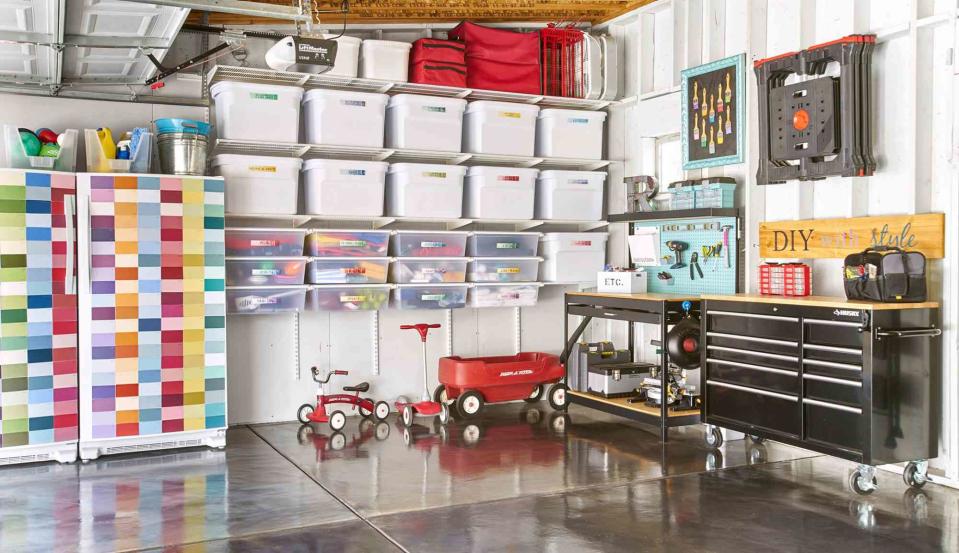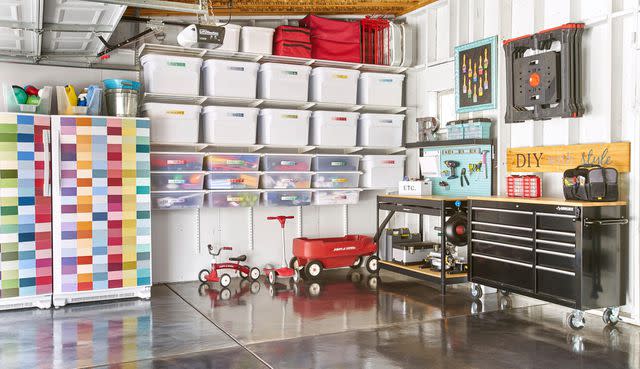9 Things You Should Never Store in the Garage
Leave these things out of the garage to keep your family—and your items—safe.

Whether you have a single, double, attached, or detached garage, the extra square footage can be helpful for storage, particularly if the rest of your house feels cramped. A garage provides a spot to store lawn tools, car supplies, and outdoor equipment that you don't want to keep in your living areas. However, you do need to be. mindful about what you store in the garage.
For starters, unless your garage is insulated or you live in a clement climate year-round, it’ll experience highly fluctuating temperature and humidity levels. Additionally, the consistent opening and closing of the garage door creates the perfect opportunity for pests to sneak inside.
So, aside from decluttering things you no longer need, consider leaving these items out of the garage entirely (and learn where you should keep them instead).

Related: 4 Smart Garage Upgrades That Add Value to Your Home
1. Propane Tanks
Propane tanks pose a serious hazard if left in the garage, or any other closed area. The propane can potentially leak which can quickly spark a fire, even from simply starting a car nearby. While you’re at it, avoid storing any flammable substances in the garage, including filled containers of gas and grease-soaked rags which can combust in high heat.
While it’s tempting to toss an extra tank for your new propane grill in the garage, the safest spot to keep them is outdoors in a well-ventilated and shaded area. Place gasoline on a shelf in a ventilated shed and dispose of oily rags by placing them in a jar, sealing it, and dropping it off at a waste disposal location.
2. Paint and Other Chemicals
Prolonged exposure to heat and cold will eventually damage leftover paint. Plus, the bottom of the cans will rust if left on a cement garage floor. Fumes may escape from pesticides and cleaning products, polluting the air which, if you walk through the garage daily, will pose a health risk.
It’s best to keep these toxic things out of the way, such as in an outdoor shed. Paint should be stored either in the basement (away from heat sources) or in a secure place elsewhere in the house.
Related: How to Dispose of Paint the Right Way
3. Pantry Goods
The garage might seem like a good spot to stash bulk or backstock supplies until you’re ready to replenish them. But think twice before placing any food here, even non-perishable items like canned goods or bottles of wine. They need to be kept at a cool, dry temperature to maintain shelf life, making most garages a less than ideal environment. Meanwhile, paper or plastic packaged food, including pet food and bird seed, are easy targets for mice to chew through.
Limit food to the kitchen or pantry by going through expiration dates regularly and maximizing the space you have available. If you need an overflow storage area for cold food—whether it be for a large household or the occasional party you host—you can employ a garage refrigerator or chest freezer. But be aware, they’ll run your electricity bill up, especially during the summer when they need to work overtime.
Related: The 10 Best Garage Refrigerators of 2023
4. Any Fabric
Although most camping gear can take up residence in the garage, sleeping bags should always be kept indoors. The reality is that anything made with fabric will look inviting to bugs and rodents alike. Plus, mold and mildew will begin to grow in the presence of heat and humidity. So steer clear of storing clothes, bedding, mattresses, rugs, or upholstered furniture in the garage to avoid any damage or surprise guests.
Hand me downs or off-season apparel should be organized into labeled totes or vacuum-seal bags and tucked away inside the house. Wrap and store mattresses, rugs, and furniture in a climate-controlled storage unit or in the basement. You can also ask a friend to temporarily hold an item or donate or discard what you’ll never use again.
Related: 6 Ways to Properly Dispose of a Sofa
5. Any Paper
Similarly to fabric, paper becomes a breeding ground for mold and mildew when faced with heat and humidity. Keep all paperwork—such as essential documents, family photographs, or mementos like written letters and cards—out of the garage so they stay preserved. The same applies to books, including comic collections, as their pages and glue in the bindings attract a slew of book eating bugs, such as silverfish, moths, and cockroaches.
Aim to go paperless wherever possible and file important paperwork away in your home office. Organize photos into albums or acid-free boxes indoors and get creative with keepsake storage. Declutter books you’ll never read again and line the ones you will onto bookcases throughout the house.
Never leave cardboard boxes, especially if they’re full with things, in the garage as they’ll also make a good meal for critters and moisture causes them to deteriorate quickly.
Related: Book Storage Ideas for All Your Favorite Literature
6. Toys
All indoor toys should stay indoors, particularly plushies or baby items that are often comprised of fabric. It’s fine to store outdoor toys in the garage as these are designed for rougher conditions. But they should either be sealed in plastic bins or frequently shaken out and cleaned to ward off mildew and insects in hiding.
Go through kids' things regularly to prevent an overflow and tidy up the toys they love in their indoor play area.
Related: 26 Kids' Storage Ideas to Control Clutter
7. Electronics, Vinyl Records, and Film Rolls
Humidity can easily destroy electronic devices and tiny pests will wiggle their way inside components, rendering them ineffective. Meanwhile, hot temps can cause vinyl records to melt and mice enjoy eating the celluloid that’s found in older film rolls. Unless you want your expensive electronics, favorite albums, or precious family memories to become obsolete, avoid storing them in the garage at all costs.
Scrap out of date electronics and organize the tech you do use inside a TV console. Learn how to store vinyl records short or long term and be sure to keep home videos in a cool, dark spot such as on a shelf in a spare closet.
8. Antique Furniture
Garages can get exceptionally warm during the summer, so if you’re keeping items made of wood in it, you’ll begin to notice them expand and warp. Moisture that seeps into the space can cause rust on metal pieces. This is bad news for any furniture, but when it comes to valuable vintage items, it’s exceptionally tragic as these are often irreplaceable.
Instead, blend antique decor into your current home style and show these pieces off rather than hide them away. If that’s not an option at the moment, consider a climate-controlled storage unit or see if a trusted relative has space for a family heirloom.
9. Firewood
Some people prefer to stack firewood in the garage because of the close proximity to both indoor fireplaces and outdoor firepits. Logically, it makes sense— and technically you can store your supply here, but it’s probably not the ideal place. For one, bugs like beetles, termites, ants, and more are attracted to wood and can bury themselves inside the logs. When the logs are in such close proximity to the walls of your home, this can pose a real problem. Firewood also needs good air flow to stay dry in order to burn. The close quarters of a garage and humidity levels can keep wood stifled and damp, leading to a higher probability of insect infestations.
Instead, consider alternative firewood storage options such as a wall-mounted rack in the hallway or a covered stand on your patio.
For more Better Homes & Gardens news, make sure to sign up for our newsletter!
Read the original article on Better Homes & Gardens.

